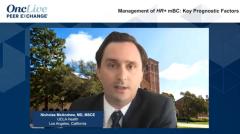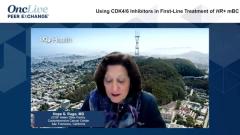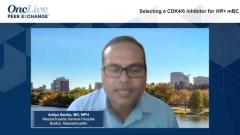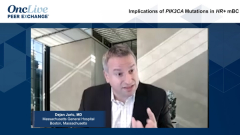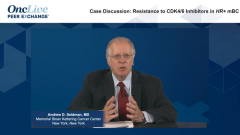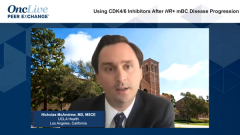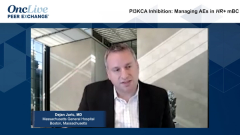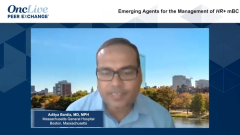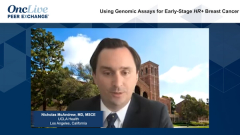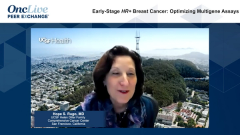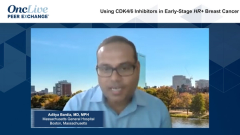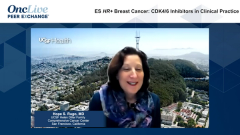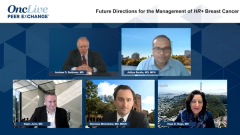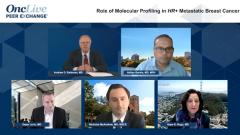
Using CDK4/6 Inhibitors in First-Line Treatment of HR+ mBC
A review of data from key phase 3 clinical trials, including ASCO 2021 updates, assessing the use of CDK4/6 inhibitors with endocrine therapy for the frontline treatment of HR-positive metastatic breast cancer.
Episodes in this series

Andrew D. Seidman, MD: Hope, could you provide us a high-level overview of what the landscape looks like in first-line endocrine therapy with CDK4/6 inhibitor use? We’ve got evolving data and some new updates in terms of overall survival. Do you want to take us through some of those studies?
Hope S. Rugo, MD: It’s a very interesting area because we’ve seen a lot of survival data in the second-line-or-greater setting. For example, for abemaciclib in MONARCH 2, we’ve seen a survival difference that was significant with the addition of abemaciclib to fulvestrant. Most recently at the 2021 ASCO [American Society of Clinical Oncology] Annual Meeting, we saw an additional update from PALOMA-3, which is a unique trial in that it included patients who had received about a third of prior chemotherapy and multiple lines of treatment where the control arm didn’t do as well, suggesting that the group who didn’t get chemotherapy, who presumably are more sensitive to endocrine therapy overall, had a survival difference in line with the other trials. We have data with ribociclib as well. In this setting, the data showed us a survival benefit in patients who have a shorter median PFS [progression-free survival] overall, because they’re pretreated with endocrine therapy or chemotherapy.
Most recently, first at the 2020 San Antonio Breast Cancer Symposium, we saw an update of the MONALEESA-7 trial with overall survival. This had already been published in the New England Journal of Medicine, and I was fortunate enough to write the editorial on that. For the first time, it showed a survival difference in a first-line setting in a pre- and perimenopausal group of patients who clearly have more highly proliferative disease that’s less endocrine sensitive. In that group of patients, there was a significant survival benefit at the final analysis in 2019, but the median overall survival in the ribociclib group had not been reached. Patients could receive the nonsteroidal AI [aromatase inhibitor] or tamoxifen. The recommendation has been not to partner with tamoxifen due to a small increase in QTc prolongation, which isn’t seen to that degree with aromatase inhibitors.
Debu Tripathy presented these updated data, which was an ongoing analysis of overall survival. It was quite remarkable. The median overall survival was increased by almost 11 months with a hazard ratio of 0.76. This group of patients has worse disease. If you looked at who received the nonsteroidal AI, the difference was 11 months, which is the same. This was almost 700 patients, and it was practice changing.
At ASCO we saw an update of the MONALEESA-3 trial, which was a unique study in that it included patients in the first- and second-line settings. There were early relapsers in the second-line setting as well. It’s a large study, with over 700 patients, and they all received fulvestrant as a backbone. That’s also quite interesting. They’ve showed that in the second-line setting, the absolute difference in overall survival is highly significant, and there’s a 6-month difference. They still haven’t reached the median in the first-line setting, but the hazard ratio is 0.64, showing a benefit in the first-line setting in this group of patients who were postmenopausal 1 way or another. The other exciting data that were shown was a hallmark analysis at 5 years showing that at 5 years, 31% of the patients who were receiving placebo and fulvestrant were alive vs 46% receiving ribociclib. That’s quite interesting.
There are a lot of other analyses that have been done looking at time to first chemotherapy, chemotherapy-free survival, and progression-free survival; all of which are dramatically longer in the group that received ribociclib. We have differences in endocrine partners. We know that nonsteroidal aromatase inhibitors are very effective. In this pre- and perimenopausal group, there’s a survival difference. Thankfully for our patients, we’re still waiting for the postmenopausal women to get the number of events.
For fulvestrant, we’re seeing a benefit with survival. These are really important. We’ve seen a lot of benefits in the first-line setting in terms of PFS but not yet survival, except for in these high-risk groups. We’ve talked about the disease-related factors, what to do, and who should receive front-line CDK4/6 inhibitors, but it’s hard to find a patient who shouldn’t get a CDK4/6 inhibitor in the first-line setting based on all these accumulated data.
Andrew D. Seidman, MD: I was going to ask that question. I don’t know if anyone else wants to chime in on this. Is there a patient who, in the first-line setting, you should be shying away from giving a CDK4/6 inhibitor? Does anyone want to take that?
Dejan Juric, MD: It’s hard to find that patient. The impact of CDK4/6 inhibitors in the treatment of an ER [estrogen receptor]–positive metastatic breast cancer patient cannot be overstated. As a fellow, we would quote overall survival in patients with metastatic breast cancer as approximately 2 years. In many of these studies, we’re now seeing 4 or 5 years. I often say I’m a simple man. You want to use the best-possible therapy when the patient is in front of you with preserved organ function, with good quality of life, and we need to hit the cancer hard where it hurts—ER and CDK4/6—and not allow for the disease burden to increase, the number of cells increase, or the number of resistance mechanisms increase. Later use of these therapies can be problematic. Some patients may never get that treatment if something catastrophic happens in the first-line setting. In my mind, it’s challenging to find a patient in whom you don’t want to use a CDK4/6 inhibitor.
Andrew D. Seidman, MD: To use a boxing analogy, you’re looking for a knockout, not a win by decision.
TRANSCRIPT EDITED FOR CLARITY


